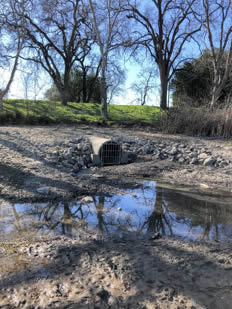Pests in Gardens and Landscapes: Quick Tips
Home and garden pesticides and fertilizers are polluting California's waterways. Problems occur when people pour garden chemicals down drains or when chemical residues wash into gutters, storm drains, and streams by rain, garden watering, or cleaning up with the garden hose. Garden chemicals not only threaten aquatic life; they can also affect the quality of our drinking water. Follow these tips to keep our rivers, creeks, and oceans clean.
 Lodi Lake
Lodi Lake
What can you do to protect water quality?
- Limit pesticide use by using nonchemical methods or least-toxic pesticides wherever possible. Ask a UC Master Gardener for help with pest problems.
- Avoid using pyrethroid insecticides. These products, which include bifenthrin, cypermethrin, and permethrin, are among the most toxic to aquatic animals.
- Control ants by reducing food sources, excluding them from homes, and using baits in containers, instead of spraying. Don't use insecticides for lawn insects unless you are sure insects are causing the damage.
- Cut back on fertilizer, more is not better. Actively growing turf, flowering shrubs, and some annuals and fruit trees require regular feeding but ornamental trees don’t. Use a mulching mower to recycle lawn clippings and reduce fertilizer applications.
- Use slow-release fertilizers, including composted organic fertilizers, which are less likely to move into water. Be sure to measure and apply them according to label directions.
- Don't let fertilizer or pesticides get onto hard surfaces such as sidewalks or driveways. Sweep any material that accidentally lands on hard surfaces back onto the lawn.
- Dispose of garden chemicals correctly. Never sweep, hose off, or pour leftover pesticides or fertilizers into drains or gutters. Dispose of unused products at your local household hazardous waste site.
Reduce runoff by making your landscape water efficient
- Reduce your landscape’s need for water by choosing water-efficient plants and garden designs.
- Minimize runoff by using mulches in beds and permeable materials for walkways and driveways. Aerate and add organic matter such as compost to heavy or compacted soils. Install terraces or other features on slopes to keep water on site.
- Check and maintain your irrigation system so water doesn’t run off your landscape onto hard surfaces and into gutters.
- Improve watering efficiency and distribution by using equipment such as drip irrigation, soaker hoses, and “smart” irrigation controllers and rotor heads.
 Lodi Lake Outfall
Lodi Lake Outfall
